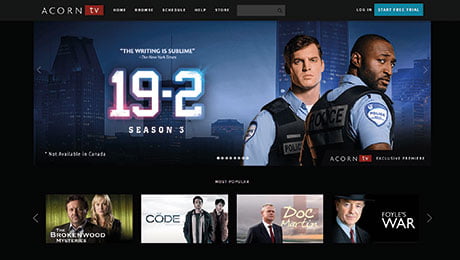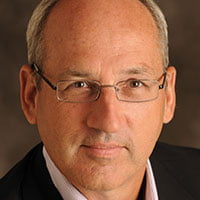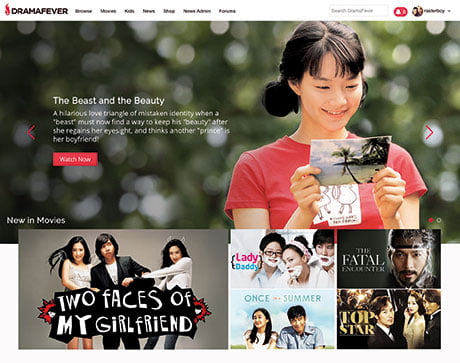Niche to their own
Posted By Adam Benzine On 20-04-2017 @ 3:49 pm In Features | Comments Disabled
A host of specialty SVoD services are looking to make their mark in the on-demand space. But can they survive against behemoths such as Amazon and Netflix? Adam Benzine reports.

Acorn TV focuses on offering UK shows for a US audience
In the emerging video-on-demand (VoD) ecosystem, Amazon and Netflix undoubtedly rule the roost, dominating the market as the biggest and most powerful players.
But as this ecosystem evolves rapidly, a host of specialised, niche over-the-top (OTT) services are starting to carve out a space for themselves.
SVoD service Acorn TV, which concentrates on offering UK shows for a US audience, announced in November that it had doubled its subscriber base. The following month, UK broadcaster ITV revealed [1] it would be teaming up with BBC Worldwide, the commercial arm of the pubcaster, to launch a competitor to Acorn named BritBox, also targeting the US market.
Two months later, UK net Channel 4 detailed plans to launch [2] its curated streaming service Walter Presents in the States. And in March, US giants Turner and Warner Bros launched [3] Boomerang, a stand-alone SVoD service featuring classic cartoon franchises. So it will continue – the on-demand genie is most definitely out of the bottle.

Soumya Sriraman
“People today understand this world, they know what it is to be in an OTT environment,” says Soumya Sriraman, the recently appointed [4] president of BritBox. “When we did some research two or three years back, there was a lot of confusion about it. ‘What do you mean? Do I have to go into the DVR and watch this? Is this where I get the extra programming? Is this BBC America?’ But now people totally get it. They understand there are different programmes and they are in different places for different reasons.”
Nevertheless, the growth of the SVoD sector has not been without its casualties. Last fall, Australian platform Presto announced [5] it would be shutting its doors, shortly after Canadian media giants Rogers and Shaw admitted [6] that they would be drawing the curtain on their struggling start-up Shomi. Meanwhile, the launch of France Télévisions’ SVoD platform, originally set for this March, has been postponed [7] until the fall.
For Acorn TV, the secret to SVoD success has been building upon the company’s 30 years-plus experience as a provider of UK content for Americans. “Back in the days of home entertainment and DVD distribution, we evolved into digital distribution,” says Mark Stevens, RLJ Entertainment’s president of Acorn brands. “Then, five or six years ago, we saw the signs that streaming was going to be a potential platform and thought we could go down that road also and offer these programmes via an SVoD service.”

Agatha Raisin is among Acorn’s originals
Acorn’s gradual approach appears to be paying off. The AMC Networks-supported service announced last autumn that it had passed the 430,000 US subscriber mark, representing 120% growth year-on-year.
Acorn predominantly offers UK drama, such as ITV’s Doc Martin and Midsomer Murders, plus George Gently and Decline & Fall from the BBC, along with several international titles including Canadian series Murdoch Mysteries and Irish legal drama Striking Out. The service has also branched out [8] into original programming, with titles such as Witness for the Prosecution and Agatha Raisin.
“We have shows that, when they first launched, did not have that big an audience,” Stevens reflects, “and it took us time – maybe a couple of years – to get the word out. When Doc Martin first came to the US, it was not on anyone’s radar and it really wasn’t until season four or five that we started to build a lot of momentum. Each season we released had more viewers and more of an audience, and now there is a big demand for it. It takes time to really help a show build an audience.”

Mark Stevens
As for the push into original programming: “It really adds a nice additional stream of content for us to help differentiate ourselves and establish a stronger bond with our consumers.”
Given Acorn’s growth, alongside the enormous success achieved by PBS with period drama Downton Abbey, it is little surprise that other players have set their sights on bringing British content to an American audience.
“It was very obvious to us that we needed to play a part in this and what made it even more exciting was that the heritage and pedigree of ITV and BBC makes it possible for us to provide a much richer offering than anyone else,” explains BritBox’s Sriraman. “It makes it possible for us to speak with a unique British voice and a British sensibility, which few others can.”
BritBox’s launch [9] in the US last month followed a long gestation period. ITV and the BBC first began work on a joint-venture, on-demand platform called Project Kangaroo [10] way back in 2007. That morphed into the internet TV service SeeSaw, which launched in 2010 before shutting down 20 months later. The partners’ plans were, perhaps, a little ahead of their time.

DramaFever provides US viewers with K-drama
Sriraman says that BritBox will benefit from the shared research and expertise of both of its parent companies. “We have a lot of primary and secondary research, and what we have learnt is that the viewing behaviour on catch-up services of broadcast channels is different to someone who comes in to a lean-back viewing experience in an SVoD world,” she explains. “We are trying to balance both of those to figure out where we are going to fall.”
The service will aim to steer its audience toward unexpected discoveries, much as Netflix and Amazon use recommendation engines.
“This is about bringing someone into the journey,” Sriraman says. “For example, via The Office, which they may know, introducing them to Inside No. 9, having them watch The Great Outdoors or serving up [1970s sitcom] Are You Being Served?
“There are many different directions we can take them, and from the Are You Being Served? route we can take them back round to newer dramas. The service takes a multidimensional or multifaceted approach to linking together the old and the new.”

Craig Hunegs
She also shrugs off some of the initial criticism that has been voiced over the service’s many high-profile UK omissions, including Downton Abbey, Doctor Who, Sherlock, Top Gear and The Great British Bake-Off. “We are not trying to be the be-all and end-all of everything British,” she says. “What we are trying to offer is a curated British experience.”
For his part, Acorn’s Stevens seems unconcerned by the prospect of a heavyweight rival moving on to his turf. “It’s nice to see that other people are now entering the marketplace,” he says. “It’s certainly good for producers and content developers, and it’s going to open up and expand people’s interest in this type of content, which will be good for everybody.”
UK drama isn’t the only international content finding an audience in the OTT space. Warner Bros last year moved aggressively into the Korean drama (K-drama) market with the acquisition [11] of DramaFever, which services K-drama series for a US audience. With a library of more than 800 titles and claiming more than 30 million unique visitors each month, the service attracts a predominantly female audience of 18- to 24-year-olds.
“We thought the channel was interesting and had been under-resourced for a couple of years under its previous ownership, and we thought that if we upped the programme and marketing budgets we could grow the service,” explains Craig Hunegs, president of Warner Bros Digital Networks and president of business and strategy for Warner Bros Television Group. “We also thought there were opportunities to expand outside North America into Latin America and, good news for us, both of those things have proven to be true.”

CuriosityStream original Miniverse
In looking at the market ahead of DramaFever’s acquisition, Hunegs says Warner Bros was influenced by the successes of Acorn and of animé service Crunchyroll. “The idea of importing programming into the US from other countries is pretty interesting,” he adds. “We believed that while US programming is the most popular and valuable worldwide, there’s programming from other countries – particularly now from Korea – that travels really well and that can appeal to and draw a broad audience.”
At present, DramaFever mostly relies on social media to bring in viewers. “We don’t have a big traditional marketing budget because we don’t really think that’s what it’s about – at least not yet. We’re big sponsors of KCON, which is the Korean pop culture event that takes place in Los Angeles. But at the moment we’re focused on the core audience.
“There are some characteristics we can triangulate through social media to figure out the audience that is most likely to respond to the shows, and then we market very directly and in very specific ways to the people we think are most likely to respond well to the service,” Hunegs adds. “What we’re talking about now is how we go out to the next concentric circle and what is the group that really isn’t as aware of DramaFever but we think will respond to it.”

Elizabeth Hendricks-North
Beyond its devoted viewership, Warner Bros had an ulterior motive for acquiring DramaFever: the service’s proprietary platform. In March, the studio giant announced it would be teaming up with Turner to launch Boomerang, a US$5 per month streaming service that will feature classic animated titles such as The Jetsons and Tom & Jerry, alongside newer animated series such as Dorothy & the Wizard of Oz. The partners are using DramaFever’s back-end technology to power the new service.
“That was built end-to-end by the DramaFever team,” Hunegs explains. “It’s pretty impressive what they’ve pulled off. Like all digital and OTT services, it will launch with good product, but it will continue to evolve over the course of the next 12 to 18 months and it will just keep getting better and better.”
He adds that Warner Bros is “in very active development” on other niche SVoD platforms, with announcements expected within the next six months.
Outside of region-specific content, one genre proving popular in the SVoD space is factual. In the UK, long-serving BBC Storyville editor Nick Fraser stepped down [12] last fall from the TV strand he founded to launch Yaddo, a curated, on-demand documentary service, featuring non-fiction titles from filmmakers such as Nick Broomfield and Kim Longinotto.
Meanwhile, on the other side of the Atlantic, Discovery Channel founder John Hendricks is seeing growth with his science-focused SVoD service CuriosityStream, which recently celebrated [13] its second anniversary.
Elizabeth Hendricks North, the service’s president and CEO (and also John Hendricks’ daughter), explains that her father “always just loved that word ‘curiosity’ because it really speaks to an innate human desire to better understand the world around us.”
The service consists of about 85% acquired content, with around 15% commissioned or created in-house, including flagship title Miniverse, which stars former astronaut Chris Hadfield.
“In a crowded ecosystem, you have to define yourself as a business, as a brand,” Hendricks North says. “There is always going to be a need for curation of content because there is so much out there now and it is really hard to find.
“We are looking at breaking science news, as well as history and more niche programmes that are hard to find on television these days but which perform well with an audience in an ad-free environment.”
As with Warner Bros and DramaFever, she adds that having a strong back-end is all-important. “It is really important in the SVoD space to have your own code base for distributing your content on different OTT platforms,” she explains. “You’ve seen with Netflix that it has its own proprietary code for how to distribute its content, and it is really important you continue to update your apps as new technologies become available. So you can embed 360º video at some point, or you can adapt to 4K streaming.”
The chaotic SVoD market can perhaps ultimately be divided into two types of services: the smaller, scrappier indies who are going all-out to succeed and the larger players for whom an SVoD service is just a small extension of a much bigger brand.
Hunegs reflects: “Right now the traditional business is hugely valuable and the SVoD market is a little bit… untested. If we see success, and I think we will, then we’ll get a bit more aggressive with it.”
That said, despite Warner Bros’ scale and weight as a major studio, launching a major, all-genre, behemoth-challenging VoD service is not on the cards.
“The world could look different in a couple of years, but right now that’s not on the drawing board,” Hunegs says, adding that the studio values its relationships with the likes of Netflix, Hulu and Amazon. “Those partnerships matter hugely to us, and we’re going to be very careful not to disrupt them.”
Article printed from C21Media: https://www.c21media.net
URL to article: https://www.c21media.net/niche-to-their-own/
URLs in this post:
[1] revealed: https://www.c21media.net/bbcww-itv-amc-team-for-britbox/
[2] plans to launch: https://www.c21media.net/walter-presents-set-for-us/
[3] launched: https://www.c21media.net/boomerang-throws-up-svod-in-us/
[4] recently appointed: https://www.c21media.net/bbcww-itv-name-britbox-boss/
[5] announced: https://www.c21media.net/foxtel-seven-west-close-presto/
[6] admitted: https://www.c21media.net/rogers-shaw-shutter-shomi/
[7] postponed: https://www.c21media.net/france-tv-ups-drama-plots-svod/
[8] branched out: https://www.c21media.net/acorn-strikes-rte-drama-copro/
[9] launch: https://www.c21media.net/atlantic-crossing-2/
[10] Project Kangaroo: https://www.c21media.net/?s=%22Project+Kangaroo%22
[11] acquisition: https://www.c21media.net/warner-bros-to-buy-dramafever/
[12] stepped down: https://www.c21media.net/storyvilles-fraser-to-leave-bbc/
[13] recently celebrated: https://www.c21media.net/screenings/c21tv/curiouser-and-curiouser
Click here to print.